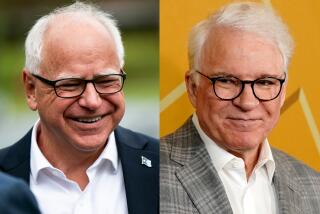MOVIES : A Wild and Crazy Sarge : Steve Martin re-enlists in his physical comedy roots by playing the lovable scam artist Sgt. Bilko in an updated film version of the timeless TV character.
- Share via
‘It used to be that television was sort of biodegradable--you did it and left it behind,” observed former “Saturday Night Live” producer Lorne Michaels in “The Re Decade,” an article by Tom Shales published in Esquire magazine in 1986. “Now we live in a time where nothing is ever going to go away again.”
Which brings us to a muddy piece of real estate in Simi Valley, where Steve Martin is starring in a new film centered on the classic TV character Sgt. Bilko. Joining the ever-growing family of TV remakes that includes “The Addams Family,” “The Brady Bunch,” “The Flintstones,” “The Beverly Hillbillies” and “The Little Rascals,” Martin’s “Sgt. Bilko” reprises “The Phil Silvers Show,” which began airing in 1955 under the title “You’ll Never Get Rich” and introduced the Bilko character. Chronicling the high jinks of a lovable scam artist who compulsively breaks Army rules in his quest for easy money, the series, which was created by Nat Hiken, made a star of Silvers.
Needless to say, public perception of the military has changed significantly since 1959, when the show went off the air, to be followed by such series as “McHale’s Navy,” “Hogan’s Heroes” and “MASH.”
However, the cast and crew of “Sgt. Bilko”--which also stars Dan Aykroyd, Phil Hartman and Glenne Headly and is being directed by Jonathan Lynn--are banking on the idea that the basic premise of Bilko is timeless. A conniving schemer who challenges the repressive forces of authority and wins, Bilko is indeed an antihero for the ages.
Martin, who can also be seen this Christmas in the sequel to “Father of the Bride,” has a talent for portraying freewheeling goofballs, and he seems to be having a good time playing Bilko. On today’s shooting schedule is a scene wherein several of Bilko’s subordinates fall into a deep pit of mud, and Bilko blithely crosses the pit by walking on their heads. This illusion is achieved by rigging Martin to a crane, so he’s not actually walking on anybody’s head. Still, after every take, the actor anxiously inquires: “Is everyone OK? Did I hurt anybody?”
“Steve’s one of the most gracious men in the business,” says Aykroyd, who developed one of “Saturday Night Live’s” best-loved routines--two wild and crazy guys-- with Martin in 1977. “In fact, he’s the main reason I wanted to be in this film. Of course, I was also a huge Phil Silvers fan. Of all the great comedians of black-and-white TV, he and [Jackie] Gleason were the biggest influences on me, so that was an added plus,” he says of Silvers, who died in 1985.
“The appealing thing about Bilko is that he ups his finger at authority, which is a message that never goes out of date,” says Aykroyd, who is cast as Lt. Hall, a character similar to one played in the television series by the late Paul Ford. “Steve puts a new spin on that because there’s something sweetly mischievous about Steve, and his Bilko is infused with that quality.”
For his part, Martin--whose first play, “Picasso at the Lapin Agile,” is slated to open Off Broadway in Manhattan in October after doing strong business at the Westwood Playhouse--doesn’t exactly see Bilko as “sweet.”
The 50-year-old actor, interviewed in his trailer amid the clutter of books and dog paraphernalia (Martin’s 6-month-old Labrador puppy, Roger, is playing outside), says his reason for signing on as Bilko was simple. “I was drawn to the role because I saw it as an opportunity to do something really broad and funny,” says Martin, who has been leaning toward comedic leading man roles rather than straight comedy as of late. “It’s hard to do what Phil Silvers did, though, and while the spirit of the series is in this movie, I wanted to do more than just imitate him, so I did it my own way.”
Martin’s Bilko is marked by the incredibly loose body language that the actor has used to great comic effect several times before. Daintily skating across the skulls of hapless colleagues who are neck-deep in mud, Martin seems to transform into rubber, his arms and legs flailing wildly as they shoot out in different directions.
“It’s not always obvious how much genius is at work behind Steve’s performances because he makes it look so casual,” says Headly, who plays Bilko’s savvy girlfriend, Rita. “He really is extraordinarily gifted, though, and he has a wonderfully collaborative way of working--we had a great time making ‘Dirty Rotten Scoundrels’ together.”
Says Hartman, who appeared in Lynn’s film of last year, “Greedy,” and is cast here as Bilko’s nemesis: “The original Bilko had a wild P.T. Barnum quality, and Steve’s playing the character with a high energy you’ve seen in previous performances he’s given. Steve is a fantastic physical comedian, and this is him getting back to his comic roots--he does some hilarious physical things, and it’s great to see it again.”
The following day, cast and crew reconvene in an impossibly picturesque suburban neighborhood in the San Fernando Valley, where a “Leave It to Beaver” street of quaint houses embellished with picket fences and rose-covered trellises will serve as the location for a scene that takes place in the married officers’ quarters.
Lynn, whose 1992 film “My Cousin Vinny” made a star of actress Marisa Tomei, seems an unlikely candidate to bring Bilko to the big screen. A genteel, intellectual man who has written three novels that were bestsellers in his native England, Lynn nonetheless believes that he’s the perfect man for this film, which makes use of locations in Southern California and Las Vegas.
“ ‘Bilko’s’ been airing in England for years and it was my favorite TV show when I was a kid, so when [producer] Brian Grazer asked if I was interested in doing a film of ‘Bilko,’ I said, ‘Yes,’ ” Lynn says. “My willingness to do it, though, was contingent on finding the perfect actor to play Bilko. Steve was my first choice for the role because he’s a great comedic actor, a gifted physical comedian, and he’s very smart. This is broad comedy, but it’s not stupid comedy; many people assume broad means stupid , but all you have to do is look at the Marx Brothers to see that comedy can be broad and intelligent.
“I looked at episodes of the TV series in preparing to shoot the film; however, this isn’t a remake--it’s an adaptation,” he points out, in a conversation that takes place during the endless downtime that bookends every snippet of actual filming. “Our ‘Bilko’ is set in the ‘90s rather than the ‘50s, so many things in it are different. It was an all-male Army in the ‘50s, and most of the people in the series were white, so a straight remake would be considered sexist and racist. The series was peppered with jokes about wives and mothers-in-law that seem old-fashioned now, so we eliminated that sort of thing too.”
Expanding on the series’ basic plot premise, which revolves around Bilko contriving various harebrained schemes to exploit the motor pool for profit, the film finds him bringing mud wrestling, greyhound racing and golf onto the base, in addition to renting out Army vehicles illegally.
“Bilko is the consummate entrepreneur, and he’ll do anything to get rich quick,” says producer Grazer, who previously worked with Martin on “Housesitter” and “Parenthood” and also produced “Greedy.” “He’s willing to be a completely duplicitous, submissive ass-kisser if there’s financial profit involved. I don’t see him as greedy, though, because he does it in a way that’s charming and ultimately he doesn’t really subvert the Army’s authority.”
Says Headly: “When Bilko takes advantage of people, he doesn’t do it in a mean-spirited way. This is a contemporary comedy, but the script has an innocence of the ‘50s that’s wonderfully gentle when compared to much of the comedy of the ‘90s.”
Screenwriter Andy Breckman points out that in addition to the presence of mud wrestling, his script for the film is infused with other, less obvious changes for the times.
“Today, you couldn’t get away with how gullible Bilko’s superior officers were in the series--you’d hold a watch up and they’d be hypnotized, so I made everybody a little smarter,” says Breckman, speaking by phone from his home in Madison, N.J.
“A more subtle change I made has to do with the fact that in the ‘50s, the draft was in place and there were vast numbers of veterans and people who were currently serving in the Army,” adds Breckman, who was born the year the television series began airing. “The series had a built-in audience it wouldn’t have now, because most people today haven’t done military service. So that was something I had to stay conscious of.
“Bilko’s a great, timeless character, though, and for a comedy writer Steve Martin is the big fish. I came of age in the ‘70s, and Martin was the yardstick by which you measured comics. The routines he did were incredibly quotable, and my friends and I used to spend endless hours replaying his monologues to each other,” says Breckman, who credits Martin with launching his career in the mid-’80s when he expressed an interest in one of his scripts. “The film was never made, but just having Steve Martin say, ‘Hey, that’s a funny script’ is all you need to get established in the movie business.
“There’s a generation of kids who’ve seen Steve in films like ‘Parenthood’ and know him as a dramatic actor, but they don’t know he can knock you out of your seat as a comedian. Hopefully, ‘Bilko’ will introduce that aspect of Steve to a new moviegoing audience.”
More to Read
The complete guide to home viewing
Get Screen Gab for everything about the TV shows and streaming movies everyone’s talking about.
You may occasionally receive promotional content from the Los Angeles Times.






